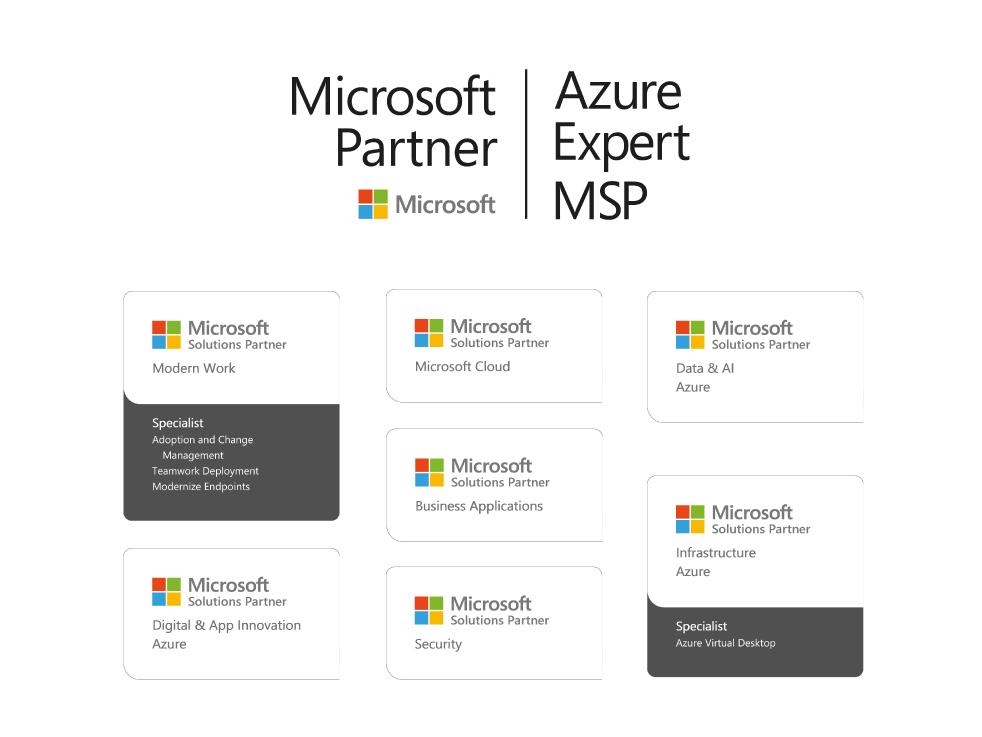Why the right Microsoft partner is key to your success:
Here’s a helpful checklist to consider when looking for your next Microsoft partnership

Managing your Microsoft environment can be complex and time-consuming with ever-changing features, services, and licensing options, especially if you are an Enterprise Agreement (EA) customer or a smaller organization with rising compute or data needs. As important as managing your Microsoft estate is, it can easily fall into complacency and be overlooked.
But with the right fit, navigating your Microsoft licensing can actually be easy.
If you’re wondering how it’s feasible, you’re in the right place. From demonstrating expertise with existing and evolving Microsoft technologies to offering supportive capabilities such as deployment, implementation, training, and managed services, your Microsoft partner should handle the heavy lifting and empower you to get the most out of this critical investment.
Because we all love a helpful checklist, here are eight key elements in a successful Microsoft partnership and why the right Microsoft partner can make all the difference.
1. An experienced, global partner that knows Microsoft
This is number one on our list for good reason. We can’t stress this enough – if you want to see success with your Microsoft investments, work with a Microsoft partner who knows Microsoft.
This means more than someone who will simply take your software order and say, “Thank you, please drive through and take your license key.” It means considering core factors, such as:
- The partner’s knowledge across the entire Microsoft ecosystem. Microsoft is more than just servers and Office. Today, Microsoft offers cloud, AI, security, productivity, collaboration, mixed reality, and a host of other solutions. Your partner needs to be well-versed in all available technologies to best support you.
- The partner’s relationship with your other vendors. With Microsoft placing more emphasis on technology collaboration and integration – whether it be software, hardware, or services – you’ll benefit from a partner who has deep partnerships with other technology providers that you want to utilize in your existing Microsoft environment.
- The partner’s experience with verticals of your size. A good place to start is by looking for partners who successfully service other organizations like yours and can demonstrate a breadth of knowledge on how varying Microsoft technologies can support your specific needs.
2. A dedicated team of Microsoft experts
While licensing guidance is just one part of your needs, it can feel all-consuming if your organization doesn’t have time to keep up with all the Microsoft licensing programs and changes. Selecting a partner with a strong background in software licensing can help you simplify the intricacies with real-world guidance.
An expert licensing partner provides a proactive approach to account management, a structured renewals management process, built-in cost optimization, complementary training, adoption, and deployment services, and proven license advisory.
3. A focus on cost savings, backed by reputable guidance
The right partner helps you optimize your Microsoft spending so you can get the most value out of your investment. Just because you may qualify for an EA does not automatically mean that is what you should sign. Microsoft has a plethora of licensing programs, including subscription-based models, that may align better with your CapEx/OpEx cashflow needs, or simply afford you the ability to scale up and down depending on the ebbs and tides of your organization. A good partner should care about your overall spending and business needs and show you options.
You also need a partner who is not just interested in getting you to buy more, but rather how to maximize what you have and shed off what you don’t need. That’s why we offer 365 Cost Optimization Services, a complimentary service that helps you identify unused licenses and optimize your spending, freeing up valuable budget for other IT initiatives. One example of this is Copilot, which many customers ask about without realizing they may already have a version included in their Microsoft 365 E5 licensing or Teams Phone technology.
4. In-house strategic services
There are a lot of Microsoft partners out there, but very few give you the full scope of in-house skills and expertise. Many may outsource their support, leading to increased costs, inefficiencies, and often confusion – particularly around licensing advice. Look for a partner that offers a full, internal team of experts with all the skills and resources you need to manage your Microsoft environment, such as certified cloud planning, professional training services, EA and Cloud Solutions Provider (CSP) services, Azure support services, and desktop modernization support.
5. Proven leadership and innovation
A great place to start understanding a Microsoft partner’s position in leadership and innovation is by inquiring about their certifications and awards. Not only is this an indication of their competence and knowledge of the products and services that they offer, but it may also signal a partner’s ability to offer more advantageous pricing or other offerings to enable your digital transformation goals, such as proof of concept or FastTrack funding. To put this into context, only a select few Microsoft partners have the expertise and scale to have attained all Microsoft Solution Area certifications plus be an Azure Expert MSP, such as SHI.
Certified Microsoft partners must meet specific criteria in order to demonstrate the highest levels of expertise in both Microsoft services and products. Look for partners with certifications in what is important to your desired business outcomes – whether it be in cloud platform, communications, Windows, devices, or application development.
6. Proactive, ongoing communication
You shouldn’t have to chase down an appointment with your Microsoft partner or only meet with them when it’s time for your annual true-up or renewal check. It’s important to establish a regular cadence, such as monthly or quarterly business reviews to ensure you have a dedicated time to review areas like consumption and licensing. A proactive partner engages with you regularly to keep you informed on updates from Microsoft, such as licensing changes and new product and service technologies, and can properly advise you with expertise, like SHI’s Microsoft and Software Advisory Group.
7. Training, adoption, and change management capabilities
Your Microsoft investments are only as good as the employees who are using the technology. While many organizations are successful with the deployment and activation of certain Microsoft solutions, just as many are challenged with adoption and proficiency. When your users aren’t aware of updates to features or functionalities, or worse, aren’t using some of the technologies at all, your investment could end up being wasted.
Seek a partner that is as committed to end-user training and adoption as they are to finding you the best technologies and solutions for your business. At SHI, we discuss training, adoption, and change management at the onset, so you can equip your users with the skills and knowledge they need to maximize productivity.
8. Aligned values
Today, organizations are growing in their commitment and focus on the environment, diversity, inclusiveness, and organizational culture, and actively looking to partner with an organization who is as well. Does your current or prospective partner have a diversity, equity, and inclusion initiative? Does your spend with them count toward your diversity spend?
For example, as the largest Minority and Woman-Owned Business Enterprise (MWBE) in the United States, SHI holds numerous certifications from our partners and suppliers attesting to our supplier diversity initiatives. We also maintain our own internal supplier diversity program and seek to engage MBE and WBE suppliers to meet SHI product requirements and operational needs.
Additionally, we’re committed to equitable, inclusive, and sustainable operations, backed by transparent initiatives to create a positive impact and a greener planet – from actively addressing these 8 U.N. Sustainable Development Goals and transitioning to 100% renewable energy across all locations by 2030, to offering and investing in sustainability solutions like asset recovery, hardware redeployment, and e-waste recycling.
Is it time for a change?
After weighing your options and considering your specific needs and values, you might decide to make a change – especially if your current Microsoft partner isn’t delivering the core factors of a successful Microsoft experience. It’s easier than you think to switch to one that will, and you don’t need to wait until the final months of a contract (like an EA) to make the move.
Your go-to partner to solve what’s next
SHI can be your MVP, a valuable partner to help you thrive amidst the complexities of Microsoft and maximize your return on investment.
Leverage our nearly 400-strong team of Microsoft specialists who cover everything from licensing to advisory services to professional and managed services. Delving into your unique needs, we offer insight and advice across the full portfolio of Microsoft products and licensing options. As a tightly integrated partner of Microsoft for over 30 years, our dedicated team will help you check off all the boxes – from providing licensing and product guidance to negotiating your best Enterprise Agreement terms and beyond.
If you are ready for a change, connect with a Microsoft specialist at SHI and learn more about how we can help. Teaming up with SHI means your Microsoft checklist is covered, so your organization can focus on what drives you forward and not what’s holding you back.





